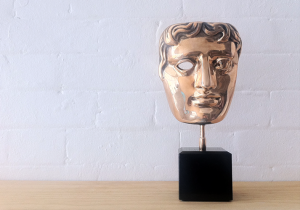
Portal 2 was a smash hit at this year’s BAFTA Game Awards. The puzzle game managed to pick up the biggest prize of the night, the Best Game award. If that was not enough Valve’s game also managed to win Story and Design awards.
We got a chance to sit down and talk with the Product Lead from Portal 2, Josh Weir and ask him a few questions along with other members of the media.
(M = media, JW = Josh Weir)
M: Congratulations.
JW: Thank you very much. It’s been an incredible night.
M: Were you expecting this kind of success?
JW: You know, like I said on stage, the fact that we were able to take game of the year with a comedy-puzzle game is kind of incredible. Especially this year. 2011 was such an incredible year for games. I’m just catching up on it myself. So to take home three awards is just crazy.
M: Something I’ve always been curious about is how you come up with the ideas for puzzles. Sometimes when I’m playing the game I think, “how on Earth did someone think of this?”
JW: One of the things I love about working at Valve is that it’s not a process where somebody sits down and makes a design and hands it down to other people. We take twelve of our designers and we throw ourselves in a room and say “okay we need five puzzles”. We sit there and we kinda jam on it and just figure out what works and what doesn’t. I think what’s important about that too is we take those ideas and we immediately get people in front of them once they are built. So that people can test us right, because we don’t want to sit here and say “yeah we know how to make games and are really good at it” because that’s not the truth right. When we make stuff what you’ll see is that half will succeed, half won’t. What we try to do is make sure that actual people sit down and make sure that we’re right and show us where we are wrong and always adapt to that. Most of the time it’s us thinking up a bunch of cool ideas and throwing them against the wall and seeing what sticks.
M: Was working with he Half Life 2 engine easy to work with?
JW: Yeah. I’ve been with the company since Half Life 2. I was very familiar with it. It was easy to know. Our engine was always kinda weird, a lot of engines are built with these bigger visions, but the Source Engine has always been something where we add a bunch of things. For Portal 2 we added a lot for dynamic lighting that was different from what you’ve seen on Left 4 Dead or The Orange Box. So it definitely was very comfortable for us because it’s our engine it’s always easy to go to the guy next door and say, “Oh I’ve got a problem” and they can tell you everything about it.
M: There was a clear expansion of narrative design in Portal 2. Was this a natural evolution of the game that was allowed due to the success of the original Portal?
JW: You know, it wasn’t just that. The first game was kind of a monologue by Glados. She was talking to you, but you never got to talk back. She had no one to talk to, so she was just musing. So the writers really wanted to sit down and say “Ok we wanna add another voice in here who can be in here and interact with it”, and so between that and the great performance from J.K. Simmons and of course Ellen McLaine, who did Glados, we had a bunch of really great voices who could communicate and broaden that narrative for us.
M: Was working with Stephen Merchant fun?
JW: You know I didn’t get to meet him, but the writers always came back with huge smiles on their faces. From day one they came to us and said “This is the guy. ” We didn’t know him and we didn’t know if he’d be interested. Sure enough he knew who we were and he was interested and the performance he turned in was spectacular. I think what was interesting about it was that because he is a comedy writer, and understands comedy, I think our writers were a bit intimidated to give him our stuff. He was able to take it and refine it and add a bunch of his own life into it. All the ad-libbing you hear and the stammering and the staggering is all him breathing life into that character on the fly. That’s what I think is so incredible. We’d come back and get the tapes and listen to all the raw, un-cut stuff and we’d be laughing in our chairs all day. That’s how we knew we were on the right track.
M: Was the co-op something really important to you?
JW: Absolutely. We had tried doing some multiplayer competitive stuff and it didn’t really work. The moment we took two people and put them together with the Portal Gun, it was really obvious that was the right choice. We tried to even joke about people competing and they didn’t wanna do that. They much prefered the co-op experience. It was definitely a big part of the game because it was an experience that you’ve not had any other way. There’s some neat things about it. You can solve harder puzzles because you’re not gonna let him down. Whereas if it was just you, you might give up. When you share that experience of “oh my God, we just did this amazing thing”, it’s all the stronger when you’ve got that person next to you, giving you the high-five.
M: So seeing as you’ve picked up three BAFTAs today, we can expect Portal 3 right?
JW: Well, we don’t have anything to announce on that. One thing we are working on is a puzzle editor that we are building into the game. In that you’ll be able to create your own Portal levels that look just like the game’s. It’s a really simple editor that everyone can use. Using the Steam Workshop you’ll be able to share your puzzles with friends online. So you can make a puzzle-share and share it with the world. I think we’ll have hundreds and hundreds of puzzles very soon.
M: Thank you for your time and enjoy the rest of your evening.
Remember we interviewed a whole load of people. Read more from Arkham City, Minecraft and Modern Warfare 3′s creators here.


 March 18th, 2012
March 18th, 2012  ramdewarkiron
ramdewarkiron
 Posted in
Posted in  Tags:
Tags: 